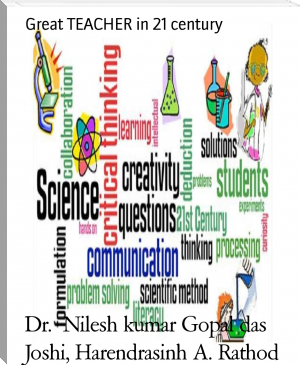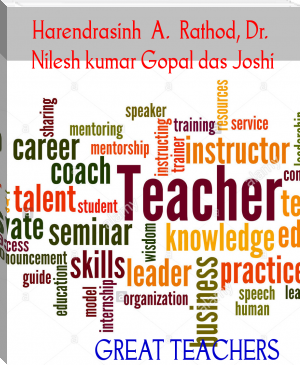Great TEACHER in 21 century - Dr. Nilesh kumar Gopal das Joshi, Harendrasinh A. Rathod (mobi ebook reader txt) 📗

Book online «Great TEACHER in 21 century - Dr. Nilesh kumar Gopal das Joshi, Harendrasinh A. Rathod (mobi ebook reader txt) 📗». Author Dr. Nilesh kumar Gopal das Joshi, Harendrasinh A. Rathod
:
In which roles are you often involved? Are there any roles in which you have less experience? Are there any new roles you might try in the future?It is clear that the 21st-century classroom needs are very different from the 20th-century ones. In the 21st century classroom, teachers are facilitators of student learning and creators of productive classroom environments, in which students can develop the skills they might need at present or in future.
However, before we begin to understand the evolving role of an ESL teacher, let’s outline some of the most popular teacher roles. Harmer, J. states that ‘it makes more sense to describe different teacher roles and say what they are useful for, rather than make value judgments about their effectiveness.’ So here are some of the most common teacher roles:
Teacher Roles:
Most teachers take on a variety of roles within the classroom, which role do you think most defines your role in the ESL classroom?
The Controller:The teacher is in complete charge of the class, what students do, what they say and how they say it. The teacher assumes this role when a new languageis being introduced and accurate reproduction and drilling techniques are needed.In this classroom, the teacher is mostly the center of focus, the teacher may have the gift of instruction, and can inspire through their own knowledge and expertise, but, does this role really allow for enough student talk time? Is it really enjoyable for the learners? There is also a perception that this role could have a lack of variety in its activities.
The Prompter:The teacher encourages students to participate and makes suggestions about how students may proceed in an activity. The teacher should be helping students only when necessary.When learners are literally ‘lost for words’, the prompter can encourage by discreetly nudging students. Students can sometimes lose the thread or become unsure how to proceed; the prompter in this regard can prompt but always in a supportive way.
The Resource: The teacher is a kind of walking resource center ready to offer help if needed, or provide learners with whatever language they lack when performing communicative activities. The teacher must make her/himself available so that learners can consult her/him when (and only when) it is absolutely necessary.As a resource the teacher can guide learners to use available resources such as the internet, for themselves, it certainly isn’t necessary to spoon-feed learners, as this might have the downside of making learners reliant on the teacher.
The Assessor:The teacher assumes this role to see how well students are performing or how well they performed. Feedback and correction are organized and carried out.There are a variety of ways we can grade learners, the role of an assessor gives teachers an opportunity to correct learners. However, if it is not communicated with sensitivity and support it could prove counter-productive to a student’s self-esteem and confidence in learning the target language.
The Organizer:Perhaps the most difficult and important role the teacher has to play. The success of many activities depends on good organization and on the students knowing exactly what they are to do next. Giving instructions is vital in this role as well as setting up activities.The organizer can also serve as a demonstrator, this role also allows a teacher to get involved and engaged with learners. The teacher also serves to open and neatly close activities and also give content feedback.
The Participant:This role improves the atmosphere in the class when the teacher takes part in an activity. However, the teacher takes a risk of dominating the activity when performing it.Here the teacher can enliven a class; if a teacher is able to stand back and not become the center of attention, it can be a great way to interact with learners without being too overpowering.
The Tutor:The teacher acts as a coach when students are involved in project work or self-study. The teacher provides advice and guidance and helps students clarify ideas and limit tasks.This role can be a great way to pay individual attention to a student. It can also allow a teacher to tailor make a course to fit specific student needs. However, it can also lead to a student becoming too dependent or even too comfortable with one teacher and one method or style of teaching.
Chapter 7 Ten Essential Characteristics of a 21st Century Educator
10 Essential Characteristics of a 21st Century Educator
This is a first draft and I am trying to learn through reflection. Would love your thoughts on the ideas below.
People have come to loathe the term “21st Century Education”, or “21st Century Teacher”. The argument is that “we are 16 years into the 21st century!”, yet I would argue, we have 84 years to go! I could have not predicted the iPad, Chromebooks, Pokemon Go, or anything else like this. Yet, as I was thinking about that very idea, it is why I believe there are some very important traits that educators need right now. We are in the 21st century, we are educators, so what does that mean and look like in our world and for education?
It is not technology that is having the biggest influence on what we do; it is the speed of change being thrust upon us. We also have more access to information and ideas, so we can do better. If you know better, you have to do better.
Here are ten characteristics that I am exploring and starting to see as crucial for educators in the 21st century and beyond, as we continue to live in a world that is continuously changing, and moving at tremendously fast speeds.
Relationship Builder
50 years ago, relationships were the most important thing in education, and 50 years from now it will be more so. Do our students feel valued when they come to school? Do we seek to simply engage them in content, or do we seek to empower them to create? I have argued for years that we need school teachers, not just classroom teachers. Every child in the school is all of our responsibilities. In a world that is becoming more and more complex, students need to know that they can trust the educators to see them as individuals, and that they are valued. None of the other strategies or approaches will matter without this foundation.
Learner/Adapter
The only constant that we can count on education is change. We know that this is true. You could have been an amazing educator 10 years ago, but if you have changed nothing since then, you could become irrelevant. As the world continuously moves forward, if you stand still, you are ultimately falling behind. This doesn’t mean that some things in education don’t stay true forever. We do not have to change everything, but we need to continuously evaluate our practices and the impact on students to grow and get better. New resources and initiatives will always be part of education, and we need to critically think about them, and ask questions to move forward, but we need to model the same openness to learning and change that we expect from our students.
“If we create a culture where every teacher believes they need to improve, not because they are not good enough but because they can be even better, there is no limit to what we can achieve.” —Dylan Wiliam
Inclusive
Do we want everyone to think the same by the time to walk out of our classrooms or schools? If we do, it is not really thinking; it is compliance. Our classrooms are becoming so much more diverse in so many aspects, and this is something we need to embrace. Every single individual has different experiences and strengths that they bring to the classroom, and we are all better if we look to tap into those strengths and build a community around them.
Reflective
Information is coming our way faster than ever. If anything, we need to slow down and critically analyze it, not simply accept everything that we hear. Reflection becomes essential in this process. This is crucial that we embed time in our days and the days of our students to not only reflect, but make their own connections to learning.
How could you possibly move forward without looking back?
“We do not learn from experience, we learn from reflecting on experience.” John Dewey
Networked/Collaborative
When you hire anyone for a job, you do not just hire them, you hire their entire network. Networks consist of both “online spaces” and face to face collaboration. Creating diverse networks in and out of education is crucial, understanding we can learn a great deal from the person across the hallway, as we can from the person on the other side of the world. To create the best experiences for students, you need access to the best ideas; this can come from anyone and anywhere. When you are networked, great ideas often find you, not the other way around.
As David Weinberger states, “The smartest person in the room is the room.” If that is true, how big is your room? How do you access this “room” to be better for your students?
Innovator
We do not only need to embrace meaningful change, but we need to create it. Innovation is about creating “new and better” things; it can be iteration (a remix of something) or invention (something totally new), but it has to be better. As the skills that students need in our evolving world become increasingly complex, we have to be in the mindset where innovation in the norm, not the exception. How do we look at what our students need and create opportunities for them to learn in deeper and meaningful ways? How do our students become these same innovators? They will need to become this in their world, and hopefully it is because of us, not in spite of us.
Remember…innovation is probably not in your curriculum, but neither are worksheets.
Leader
The notion that “everyone is a leader” is something that has been challenged a great deal over the years, yet what does being a “leader” mean? It is not being a boss. There are some principals who are not leaders, and some teachers who are amazing leaders. What is crucial to think about is whether or not you have the ability to influence others to positively move forward in specific areas. In our schools we have leaders in curriculum, technology, community building, and so many other areas. We not only empower people to lead, but give them the opportunities to lead from where they are. If only a few people are “allowed” to lead, meaningful change will happen at a much slower pace.
Storyteller
“If history were taught in the form of stories, it would never be forgotten.” ― Rudyard Kipling
“Lecture” has become a bad word in many education circles, while Ted Talks have exploded. Many see this as irony, but what I see is that these aren’t lectures as much as they are stories.
If we want meaningful change, we have to make a connection to the heart before we make a connection to the mind. People have to feel something. Simply sharing information is not a way to create this connection, but we have to think about how we create this connection. Telling stories helps people create their own connections and meaning, and in





Comments (0)